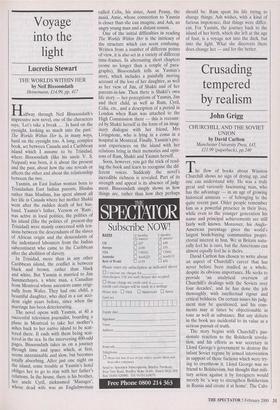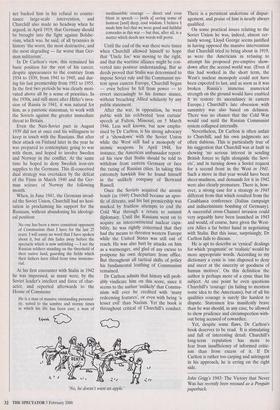Crusading tempered by realism
John Grigg CHURCHILL AND THE SOVIET UNION by David Canton Manchester University Press, £45, £11.99 (paperback), pp.240 The flow of books about Winston Churchill shows no sign of drying up, and one can understand why. He was a truly great and variously fascinating man, who has the advantage — in an age of growing historical amnesia — of belonging to the quite recent past. Older people remember him as a powerful presence in their lives, while even to the younger generation his name and principal achievements are still fairly well known. Moreover, his Anglo- American parentage gives the world's largest book-buying communities propri- etorial interest in him. We in Britain natu- rally feel he is ours, but the Americans can almost equally feel he is theirs.
David Carlton has chosen to write about an aspect of Churchill's career that has never before been studied as a whole, despite its obvious importance. He seeks to provide 'an analytical overview of Churchill's dealings with the Soviets over four decades', and he has done the job thoroughly, with intellectual rigour and critical boldness. On certain issues his judg- ment may be questioned, and his com- ments may at times be objectionable in tone as well as substance. But any defects in the book are incidental to its value as a serious pursuit of truth.
The story begins with Churchill's pas- sionate reaction to the Bolshevik revolu- tion, and his efforts as war secretary in Lloyd George's government to destroy the infant Soviet regime by armed intervention in support of those factions which were try- ing to overthrow it. Lloyd George was no friend to Bolshevism, but thought that mili- tary action against it by foreigners would merely be 'a way to strengthen Bolshevism in Russia and create it at home'. The Cabi- net backed him in his refusal to counte- nance large-scale intervention, and Churchill also made no headway when he argued, in April 1919, that Germany should be brought into the fight against Bolshe- vism, which was, he said, of all tyrannies in history 'the worst, the most destructive, and the most degrading — far worse than Ger- man militarism'.
In Dr Canton's view, this remained his basic position for the rest of his career, despite appearances to the contrary from 1934 to 1939, from 1941 to 1945, and dur- ing his last premiership from 1951 to 1955. In the first two periods he was clearly moti- vated above all by a sense of priorities. In the 1930s, and still more after Hitler's inva- sion of Russia in 1941, it was natural for him, as a patriotic statesman, to work with the Soviets against the greater immediate threat to Britain.
Even the Nazi-Soviet pact in August 1939 did not at once end his willingness to keep in touch with the Russians. But after their attack on Finland later in the year he was prepared to contemplate going to war with them, and hoped to involve Sweden and Norway in the conflict. At the same time he hoped to deny Swedish iron-ore supplies to the Germans. This ill-conceived dual strategy was overtaken by the defeat of the Finns in March 1940 and the Ger- man seizure of Norway the following month.
When, in June 1941, the Germans invad- ed the Soviet Union, Churchill had no hesi- tation in proclaiming his support for the Russians, without abandoning his ideologi- cal position: No one has been a more consistent opponent of Communism than I have for the last 25 years. I will unsay no word that I have spoken about it, but all this fades away before the spectacle which is now unfolding — I see the Russian soldiers standing on the threshold of their native land, guarding the fields which their fathers have tilled from time immemo- rial.
At his first encounter with Stalin in 1942 he was impressed, as many were, by the Soviet leader's intellect and force of char- acter, and reported afterwards to the House of Commons:
He is a man of massive outstanding personal- ity, suited to the sombre and stormy times in which his life has been cast; a man of inexhaustible courage — direct and even blunt in speech — [with a] saving sense of humour [and] deep, cool wisdom. I believe I made him feel that we were good and faithful comrades in this war — but that, after all, is a matter which deeds not words will prove.
Until the end of the war there were times when Churchill allowed himself to hope that 'Uncle Joe' was moving to the right, and that the wartime alliance might be con- verted into postwar understanding. But as deeds proved that Stalin was determined to impose Soviet rule and the Communist sys- tem upon eastern Europe, Churchill began — even before he fell from power — to revert increasingly to his former stance, without breaching Allied solidarity by any public statement.
After the war, in opposition, he went public with his celebrated 'iron curtain' speech at Fulton, Missouri, on 5 March 1946. Less well known, but now empha- sised by Dr Carlton, is his strong advocacy of a 'showdown' with the Soviet Union while the West still had a monopoly of atomic weapons. In April 1948, for instance, the American ambassador report- ed his view that Stalin should be told to withdraw from eastern Germany or face the razing of Russian cities. In taking this extremely hawkish line he found himself in the unlikely company of Bertrand Russell.
Once the Soviets acquired the atomic bomb (in 1949) Churchill became an apos- tle of détente, and his last premiership was marked by fruitless attempts to end the Cold War through a return to summit diplomacy. Until the Russians went on to acquire an intercontinental nuclear capa- bility, he was rightly concerned that they had the means to threaten western Europe while the United States was still out of reach. He was also hurt by attacks on him as a warmonger, and glad of any excuse to postpone his own departure from office. But throughout all tactical shifts of policy his fundamental loathing of Communism remained.
Dr Carlton admits that history will prob- ably vindicate him on this score, since it seems to the author 'unlikely' that Commu- nism will ever be credited with 'many redeeming features', or even with being 'a lesser evil' than Nazism. Yet the book is throughout critical of Churchill's conduct.
'No, he doesn't want an apple.' There is a persistent undertone of dispar- agement, and praise of him is nearly always, qualified.
On some practical issues relating to the Soviet Union he was, indeed, almost cer- tainly wrong. Lloyd George seems justified in having opposed the massive intervention that Churchill tried to bring about in 1919, as were the Americans in refusing to attempt his proposed pre-emptive show- down after the second world war. (Even if this had worked in the short term, the West's nuclear monopoly could not have been expected to last, and as soon as it was broken Russia's immense numerical strength on the ground would have enabled it to restore its ascendancy in eastern Europe.) Churchill's late obsession with summitry was also based on delusion. There was no chance that the Cold War would end until the Russian Communist system collapsed internally.
Nevertheless, Dr Carlton is often unfair to Churchill, and his own judgments are often dubious. This is particularly true of his suggestion that Churchill was at fault in showing 'no serious interest in sending British forces to fight alongside the Sovi- ets', and in turning down a Soviet request for a second front in the West in 1941. Such a move in that year would have been sheenmadness, and demands for it in 1942 were also clearly premature. There is, how- ever, a strong case for a strategy in 1943 different from that which resulted from the Casablanca conference (Italian campaign and indiscriminate bombing of Germany). A successful cross-Channel invasion could very arguably have been launched in 1943 and would, of course, have given the West- ern Allies a far better hand in negotiating with Stalin. But this issue, surprisingly, Dr Carlton fails to discuss.
He is apt to describe as 'cynical' dealings for which 'pragmatic' or 'realistic' would be more appropriate words. According to my dictionary a cynic is 'one disposed to deny and sneer at the sincerity or goodness of human motives'. On this definition the author is perhaps more of a cynic than his subject. At one point he even questions Churchill's 'courage' (in failing to mention some idea to the Americans), but of all his qualities courage is surely the hardest to dispute. Statesmen less manifestly brave than he was should, in any case, be allowed to show prudence and circumspection with- out being accused of cowardice.
Yet, despite some flaws, Dr Carlton's book deserves to be read. It is stimulating and full of interesting detail. Churchill's long-term reputation has more to fear from insufficiency of informed critic- ism than from excess of it. If Dr Carlton is rather too carping and astringent in his approach, he is erring on the right side.
John Gtigg's 1943: The Victory that Never Was has recently been reissued as a Penguin paperback



























































 Previous page
Previous page